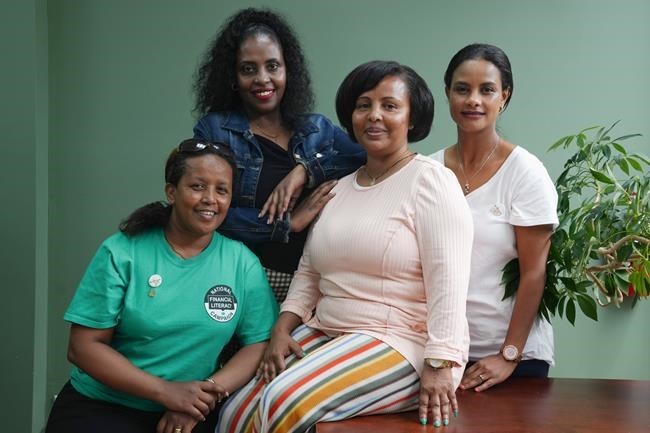TORONTO — The Ethiopian Association in the Greater Toronto Area was not set up to provide shelter support, but the head of the organization said that when dozens of asylum seekers began showing up at its door seeking help, it had to adjust. Â
Meserat Demeke said that between late May and mid-June, at least 200 Ethiopian migrants approached the organization's office in Toronto's east end, saying they needed help accessing food and somewhere to sleep.Â
"I think we picked up about 40 people that day," Demeke told The Canadian Press, recalling the day of May 25, when the association began assisting unhoused Ethiopian migrants in Toronto. She said she personally hosted a dozen people in her home that night.
The following day, as word spread that the association was helping refugee claimants find shelter, more people began turning up at its door.Â
"Then more people are coming and coming … We were sitting here until 12 o’clock at night trying to find somewhere to put them. That was a very tiring process," Demeke said.
In late May, Toronto's Deputy Mayor Jennifer McKelvie sounded an initial alarm over the rise in refugee claimants seeking beds in Toronto's shelters, noting the numbers had grown by 500 per cent over the past 20 months. Â
She said Toronto's severely overstretched shelter resources could not cope with demand and that asylum seekers looking for beds in over-capacity city facilities would be referred to federal programs effective June 1. Â
The city has seen asylum seekers sleeping on the sidewalks in recent weeks, unable to get a space in the shelter system.Â
Shortly after taking office last month, Mayor Olivia Chow called the situation "a crisis," and echoed McKelvie's call for Toronto to urgently get more support.Â
The federal government then announced nearly $100 million in funding for asylum seeker shelter support.
This week, Prime Minister Justin Trudeau said it was "unacceptable" that, in Canada, "vulnerable asylum-claimants" have to sleep on the streets, but stressed the solution required co-ordination with all levels of government.Â
Demeke suggested the fact that many asylum seekers in need of shelter are from countries in Africa may have contributed to what she called government inaction.Â
“Can you imagine if they were European immigrants on (the) street sleeping? Would they be quiet?" she said.Â
The Ethiopian association has rented a long-term Airbnb for just under $8,000 a month and rented another residential unit in Oshawa, Ont., to house several dozen recent asylum seekers, Demeke said.Â
The owner of the units, himself a former refugee, has given the association a discount, Demeke explained.Â
The Ethiopian association has also distributed food and other necessities like feminine hygiene products and transit passes, Demeke said, adding that it deserved to be reimbursed by the city or other levels of government for costs incurred so far. Â
Outside the Ethiopian community, other institutions have warned that their efforts to help asylum seekers have strained scarce resources. Â
The Black-led Revivaltime Tabernacle church said it has sheltered as many as 200 people on cots in its basement.Â
Speaking to reporters on July 28, when Chow visited the church, Pastor Judith James said accommodating such large numbers of people had sent utility bills skyrocketing, and undermined the congregation's ability to serve its community by putting events like long-planned weddings in jeopardy. Â
"We’re asking those who have the power to make change,” James said.Â
At the same press conference, Pastor Eddie Jjumba of Dominion Church International Toronto, said his congregation had sheltered as many as 250 people in a building across the street.
"But it’s not a solution," Jjumba said. "It’s a band aid."
The City of Toronto said that, along with community leaders, it had "escalated" efforts to respond to the urgent shelter needs of asylum seekers.Â
"We extend our sincere thanks for the leadership and mobilization of many community groups and faith organizations in Toronto," the city's shelter, support and housing administration wrote in a statement this week.Â
"We are engaged in ongoing discussions with many of these community and faith organizations to see how the city will continue working with these groups."
This report by The Canadian Press was first published Aug. 4, 2023.
Kiernan Green, The Canadian Press




